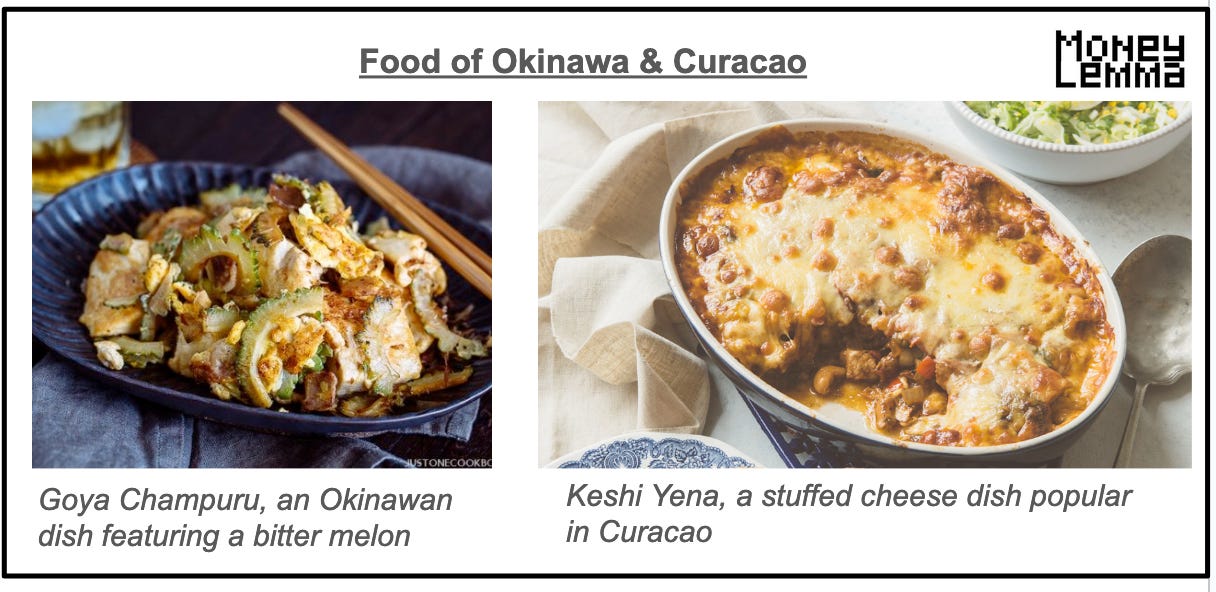Proposal for a Curacao-Okinawa Exchange Program
two islands meant for each other
Globalization pinches together the ends of the world to make sails of progress. For the last century a global economic order has created unprecedented wealth, peace, and technology. It has also destroyed ways of life and sowed seeds of discord and discontent. The Economist believes the globalization regime is under serious strain as the human costs (job loss, social changes) have reached a breaking point. Globalization has become less a sail, and more a ripped parachute. Still pinching the corners of the world, still harnessing the wind, but careening uncontrollably toward an unpleasant fate.
What the world needs is less economic integration and more human integration. Strangers meeting strangers not to negotiate outsourcing terms or plan a joint venture into nickel mining, but for the sake of meeting. With this in mind, I introduce the Curacao-Okinawa Exchange Program. These two islands on opposite ends of the world have so much in common historically, economically, and even ecologically. People from these places need to meet and hang out. Will flying a group of Okinawans out to Curacao for three weeks, and a similar reverse trip, make anyone rich? Don’t care. Will it solve the world’s problems? Don’t care. It should be done because it’s a cool idea. Not every idea has to be a startup. In fact, this is a good idea because it doesn’t have to be pitched to some overconfident and unaccountable venture capitalist whose lifelong goal is to get their surname on a Stanford dorm.
To cement this already bullet-proof case, consider the similarities between these two islands.
Imperial History
Okinawa is a Japanese prefecture (state) that was an independent kingdom until the 17th century, when it came under control of Japan, officially gaining prefecture status in the late 19th century. Curacao, in the Caribbean, was also minding its own business until it was colonized by the Spanish in the 16th century, and eventually became an autonomous state within the Kingdom of the Netherlands in the 20th century. Two small islands on opposite ends of the world, both forced under the thumb of large empires around the same time, both achieving some form of autonomy around three hundred years later.

American Military Bases
Both islands are home to American military bases. In fact, Okinawa has <1% of Japan’s population but 75% of American soldiers stationed in Japan are on Okinawa. Okinawa has more active American servicemen per capita than the United States does. About two in every one hundred people on Okinawa are US soldiers. Curacao, similarly, is home to US military bases and servicemen.
Strategically Important in WWII
Both were strategically important in WWII. Curucao housed some of the world’s largest oil refineries and were critical to the Allies fuel supply in the Pacific theater. Okinawa was the halfway point between Japan and Taiwan, making it a critical hopping point for the Allies and home to one of the bloodiest battles of the war.
Tourism Economies
Both are home to beautiful beaches that are destinations for global travelers. In terms of employment and contribution to GDP, both are heavily reliant on tourism.
Lower Income States in Rich Countries
Okinawa is one of the poorest Japanese prefectures, while Curacao is significantly poorer than most parts of the Netherlands (of which it is part). This creates unique political dynamics in both areas. Okinawa, for example, receives billions in subsidies from the rest of Japan, partially to compensate for the burden of hosting American military bases.
Island Cultures
Both are influenced by their colonial histories, both have unique dialects, both have delicious local cuisines, both are known for being a bit more “laid back” culturally relative to their mainland counterparts, and both have some of the longest life expectancy rates in the world.
Coral Reefs
Summary Table
Please support the Curacao-Okinawa Exchange Program
I don’t know anybody from either of these islands, and I’ve never visited either, yet I’m confident they need an exchange program. A formal, recurring program that introduces random people from each island to each other. These two islands have a strange amount in common given how fundamentally different they are. One island in the Caribbean, one in Japan. Different languages, different histories, different food, different music, different religions, different everything. Yet they share so much. It’s fate! A Hugh Grant rom-com that practically writes itself (editors note: all Hugh Grant rom-coms write themselves). I believe this program will create lasting, meaningful relationships, uncover amazing insights into the human condition, and make the world at least 1% better. There are many exchanges in our globalized world, but this one will be special.








